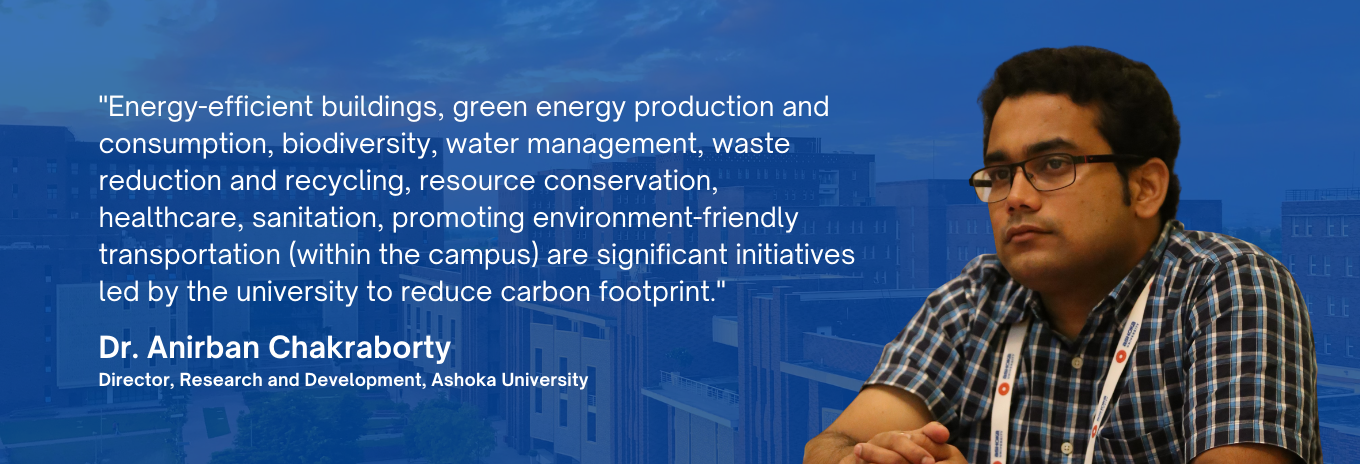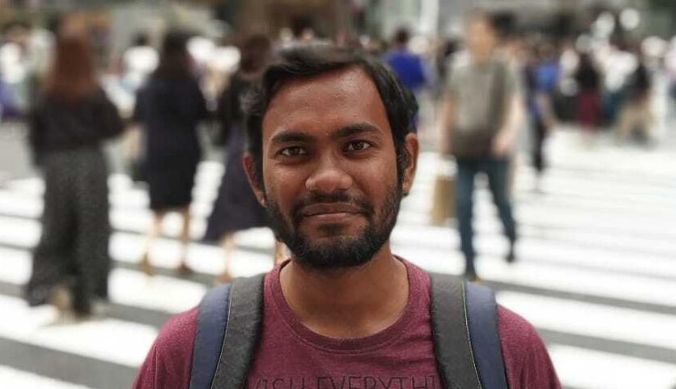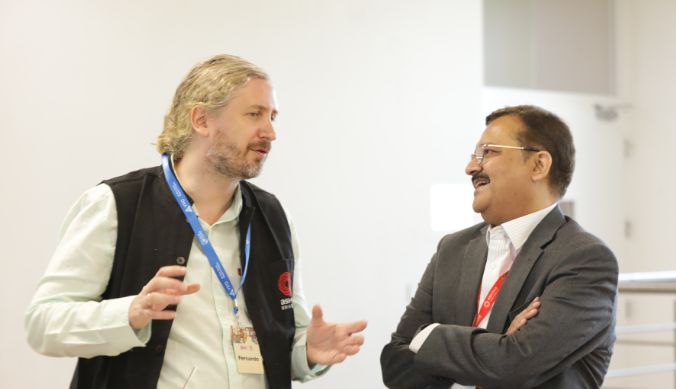Re-Purposing Universities for Sustainable Societies: The Integrated Sustainability Model at Ashoka
Dr. Anirban Chakraborty writes on Ashoka University’s sustainability model that approaches its commitment through sustainability-focused courses, research, and operations.
Traditionally, universities’ role was primarily to educate young minds and offer them ample opportunities to use their potential for self-growth and well-being. Considering the relevance of Sustainable Development, this perception has evolved gradually to include environmental management, public participation, community development and social responsibility in university teaching, research and other activities. Today, universities across the globe are giving increasing priority to the challenges of sustainability, encouraged by a variety of drivers and societal pressures.
The Indian higher education sector’s size and scale highlight its importance in addressing the nation’s social, economic, and environmental sustainability. A sustainable campus is one that maintains a balance between economic prosperity, environmental conservation and social and economic justice. In most Indian universities, sustainability education and issues are confined to specific courses, often isolated from research, and are unlikely to be linked to campus operations. Thus, universities in India possess a tremendous opportunity to improve their sustainability performance and role as agents of change. Moreover, sustainable development should look beyond the narrowed definition of environmental aspects and broaden their roles to exert social and economic perspectives.
Given the complex nature, sustainability education must pursue an integrative approach to modelling sustainability in the university’s core functions and systems. While it is challenging to implement changes in older systems, Ashoka is managing things differently as a new-aged university and has attempted to integrate education, research, and operations to address sustainable development issues.
Environmental Aspects: The university has made efforts to follow environmental sustainability drives in and around the campus. Energy-efficient buildings, green energy production and consumption, biodiversity, water management, waste reduction and recycling, resource conservation, healthcare, sanitation, promoting environment-friendly transportation (within the campus) are significant initiatives led by the university to reduce carbon footprint. The university conducts regular energy audits and has involved green building consultants working with architects, planners, and policy makers to emphasise environmental sustainability.
Sustainability Teaching and Research: Courses such as ‘Agriculture, Food and Sustainability’; ‘Environment and Social Exclusion’; ‘Exploring Life in the Neighbourhood Lab’; ‘Environmental Economics’; ‘Cities, Ecology and Equity’ are closely linked to the concept of sustainability. Programmes such as Young Scholars Programme (YSP), Young India Fellowship (YIF), Ashoka-X offer many packages and learnings on sustainability in all its dimensions.
Many research projects at Ashoka are addressing sustainability issues in fields ranging from history, anthropology, sociology, economics to environment and basic sciences. The university is making efforts with its experienced faculty to develop new initiatives and research centres to expand its horizon and scope of research and teaching in sustainability fields. As an immediate step, Ashoka has started its new Centre for Climate Change and Sustainability (3Cs)—to strengthen collaborations in this field, enhance education, research and awareness on climate change, and build a strong climate action community.
Community engagement and Social Justice: The university faculty and students are carrying out several projects and programmes to engage the local communities. These initiatives address local issues such as streamlining the implementation of government’s policies in education, women’s safety, health and sanitation, e-governance etc. Concurrently, the university also carries out social engagement and public participation through various unique centres (CSIP, CSBC, CSGS, CMGGA). These centres are trying to entrench sustainable development principles, including social justice, equity, democracy and religious tolerance, significantly relevant to Indian societies.
Ashoka runs scholarship programmes to ensure quality education accessible to deserving students, irrespective of their socio-economic backgrounds, ethnicity, gender, gender identity or disability. The university has provided need-based financial aid of USD 34.2 million to over 3000 students in the last ten years. In 2020-21, nearly USD 8.4 million aid has already been granted by the university, and over 51% of undergraduate students at Ashoka are studying on financial assistance. Regarding diversity: students come from 18 countries, 27 Indian states, and 236 towns and cities; women comprise 56% of the student body; 18 Languages spoken on campus. Taking cognisance of the stakeholders with certain disabilities, the university has focused on constructing ramps in all building entrances, braille signage and accessible campus facilities. The university offers care for students with learning disabilities or psychological support through special centres such as the Office of Learning Support (OLS) and the Ashoka Centre for Well Being (ACWB). These are unique initiatives in the Indian context and need to be popularised and encouraged as essential and mandatory supports.
Since its inception, Ashoka has implemented strategies and taken initiatives directed towards ensuring affordability and access, well-being and welfare, diversity and inclusion, as well as outreach and engagement. The pedagogy, courses, curriculum, activities at the university have been designed to promote sustainability in exchanging knowledge, communication, research, teaching and operations. The university is consistently paying more attention to adopting global best sustainability practices. More formal approaches in specific areas and external audit processes are needed for future developments.
The author is the Director, Research and Development at Ashoka University. The views and opinions expressed in this article are those of the author and do not necessarily reflect that of Ashoka University.













